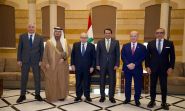
Every era has its instruments of propaganda — voices that amplify power, shaping history, politics, and identity to advance agendas far removed from democratic principles and the natural order of events.
Since the assassination of Hezbollah’s former Secretary-General Hassan Nasrallah, and after a period of denial and confusion within the resistance camp, the group’s media outlets have shifted toward image rehabilitation. Hezbollah is now framed as calm, rational, and even peace-seeking—while Israel is cast as the sole aggressor. This reframing serves a broader purpose: to smear any critic of Hezbollah as complicit in “killing Lebanese,” a familiar refrain in the resistance playbook.
To push this narrative, Hezbollah has deployed a range of public figures—with different backgrounds, tones, and political postures—but united by one strategic characteristic: they are all Christian. The goal is not merely diversity; it is to position Hezbollah as a post-sectarian force, divorced from its radical Islamic roots, and to obscure its long-standing role in undermining democracy and devastating Lebanon’s diverse communities, Christian, Sunni, Druze, and even dissenting Shias.
These figures appear across media platforms to extol Hezbollah’s virtues, its lofty values, and its fierce defense of the land. Some even make staggering claims, such as asserting that Hezbollah has never killed a single Lebanese citizen and that its actions have always served national unity.
Listing the contradictions in this narrative is not only exhausting, it is damning. From the bloody internecine war against the Amal Movement (in which, by Amal’s own account, Hezbollah killed more Lebanese than Israel ever did), to the long trail of political assassinations tied to the group by international courts, the historical record is stark and indisputable.
Propaganda in itself isn’t new; it’s an expected part of any ideological struggle. What is troubling now is the shift among non-Christian political leaders in Lebanon. Many are beginning to articulate what Christian leaders were once vilified for: alternative visions for peace, sovereignty, and stability. Sunni voices now call for direct negotiations with Israel. Druze leaders publicly explore the idea of Israeli protection for minorities. Figures from across sects speak openly of peace, not as betrayal, but as a moral and strategic necessity. In contrast, many Christian leaders, once the vanguard of Lebanon’s liberal, state-building vision, find themselves coerced into silence or worse, conscripted into Hezbollah’s soft narrative.
It’s time to reassess. What we are witnessing is not just an ideological battle but a regression: a reversal of the intellectual and political leadership that Christian thought once offered in shaping modern Lebanon. That space is now shrinking, squeezed by propaganda, fear, and sectarian manipulation, while progressive Muslim voices increasingly challenge old taboos.
In the end, Hezbollah seems determined to drag Lebanon’s Christians back into a dark chapter of history.



Comments